Odds Of Reviving Iran Nuclear Deal Worse After Doha Talks -US Official
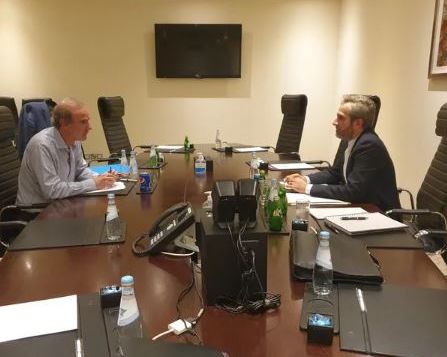
The chances of reviving the 2015 Iran nuclear deal are worse after indirect US-Iranian talks in Doha that ended without progress, a senior US official told Reuters on Thursday.

The chances of reviving the 2015 Iran nuclear deal are worse after indirect US-Iranian talks in Doha that ended without progress, a senior US official told Reuters on Thursday.
"The prospects for a deal after Doha are worse than they were before Doha and they will be getting worse by the day," said the official on condition of anonymity. "You could describe Doha at best as treading water, at worst as moving backwards. But at this point treading water is for all practical purposes moving backwards."
After a pause in the 11-month-long Vienna round of nuclear talks in March, the European Union foreign policy chief Josep Borrell visited Tehran on June 25 and arranged the talks in Qatar.
The official would not go into the details of the Doha talks, in which European Union officials shuttled between the two sides trying to revive the 2015 Joint Comprehensive Plan of Action (JCPOA) agreement under which Iran had limited its nuclear program in return for relief from economic sanctions.
"Their vague demands, reopening of settled issues, and requests clearly unrelated to the JCPOA all suggests to us ... that the real discussion that has to take place is (not) between Iran and the US to resolve remaining differences," he said. "It is between Iran and Iran to resolve the fundamental question about whether they are interested in a mutual return to the JCPOA."
Report by Reuters
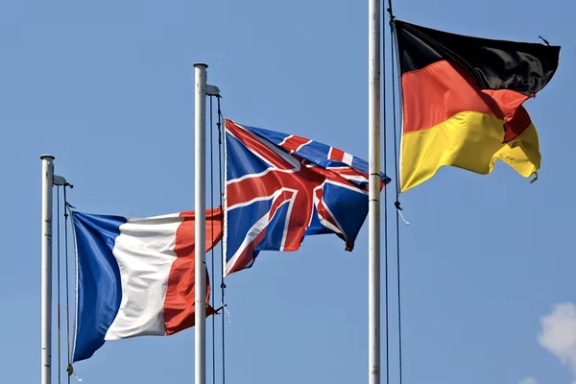
The UK, France and Germany called on Iran to stop and reverse its nuclear escalation, return to full cooperation with IAEA and seize the offer on the table without further delay.
In a Thursday statement ahead of a Security Council meeting on the implementation of resolution 2231 that endorsed the 2015 nuclear deal, the E3 said, “Unfortunately... Iran once again refused to seize the opportunity and, instead, made new extraneous and unrealistic demands,” referring to indirect Tehran-Washington talks held in Doha this week.
Criticizing Iran’s installation and use of additional advanced centrifuges and the removal of the International Atomic Energy Agency’s JCPOA-related surveillance and monitoring equipment, they said some of the most serious steps to accelerate the pace of Tehran’s nuclear program have been taken during the negotiation process aimed at returning Iran and the US to the Joint Comprehensive Plan of Action.
Expressing deep concerns over Iran’s increasing uranium stockpiles enriched to 20-60 percent purity, the E3 said, “Iran’s complete termination of key JCPOA-related transparency measures is therefore a particularly negative, counterproductive and provocative step, which the UN Security Council cannot remain silent on.”
They also denounced Iran’s “provocative” launch of the Zolfaqar Satellite rocket, which could be capable of delivering nuclear weapons and can be used to construct long-range and intercontinental ballistic missiles.
“We strongly condemn Iran’s continued destabilizing activity in the region and call upon Iran to stop all ballistic missile activities and proliferation inconsistent with UNSCR 2231,” they concluded.
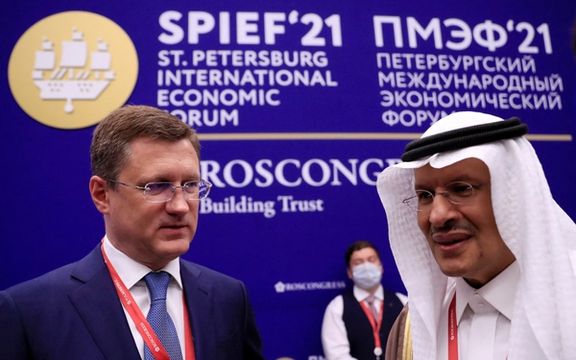
Oil prices rose slightly further Thursday after a brief Opec+ meeting, following an upturn Wednesday with the ending of US-Iran nuclear talks in Doha, Qatar.
Benchmark Brent crude was around $116 a barrel Thursday, with theJoint Ministerial Monitoring Committee of Opec+, led by Russia and Saudi Arabia, rubber-stamping previously agreed quotas in Vienna.
Reuters news agency Thursday cited Iranian officials claiming Tehran had felt little pressure to give way to the United States in Doha. “We are in no rush,” one said. “Our nuclear program is advancing every day. Time is on our side… we want a deal that 100 percent serves our national interests. We want a good deal.”
At the United Nations Security Council in New York, Ireland’s Byrne Nason, the facilitator of resolution 2231, by which the UNSC in 2015 endorsed the nuclear deal (the JCPOA, Joint Comprehensive Plan of Action), reiterated the resolution’s call for “member States…to take such actions as may be appropriate to support the implementation of JCPOA.”
In a statement to the security council, the three European JCPOA signatories – France, Germany, and the United Kingdom – laid all blame for failure to restore the JCPOA with Iran, which they charged had “refused to seize this diplomatic opportunity.”
The US left the JCPOA in 2018, introducing stringent third-party sanctions that the administration of President Donald Trump said would reduce Iran’s oil exports from around 2.5 million bpd to zero. But Tehran has maintained a low level of exports, claiming its oil revenue March 21- May 21 was up 60 percent year-on-year, and has since 2019 expanded its nuclear program beyond JCPOA limits.
‘Keep working’
In announcing by tweet Wednesday the ending the US-Iran Doha talks without the “progress…hoped-for,” Enrique Mora, the senior European Union official coordinating the talks, said “we will keep working with even greater urgency to bring back on track a key deal for non-proliferation and regional stability.”
Iran said Doha had floundered because the US had failed to offer assurances it would not, after returning to the JCPOA, keep what the JCPOA called “discriminatory regulatory and procedural requirements in lieu of the sanctions.” But Foreign Ministry Spokesperson Nasser Kanani said Wednesday that the talks had been “held in a professional and serious atmosphere,” implying the process might continue.
The US State Department said the lack of breakthrough in Doha came from Iran “raising issues wholly unrelated to the JCPOA” and not being ready “to make a fundamental decision on whether it wants to revive the deal or bury it.” There were also suggestions that Iran had raised International Atomic Energy Agency questioning of uranium traces found at three sites used before 2003 – a matter unrelated to the JCPOA, but which led the IAEA board to pass a critical resolution earlier this month.
‘Destabilizing’
Washington’s overall stance was outlined to the Senate in May by Robert Malley, the US special envoy who led US negotiators in Qatar. Malley told senators Washington would continue diplomacy to restore the JCPOA as long as “we assess that the non-proliferation benefits of a return to the deal are worth the sanctions lifting we would need to provide.”
Critics of the JCPOA argue either that benefits never existed or no longer do so. In London, the Daily Telegraph reported Thursday that three former ministers would back a parliamentary motion calling for a fresh agreement that would last longer than the JCPOA, require stricter monitoring, and cover “Iran’s other destabilising [sic] activities in the region,” a reference to its various alliances.

The United States expressed disappointment that a two-day round of indirect talks with Iran brokered by the European Union ended without progress on Wednesday.
A State Department spokesperson said, "While we are very grateful to the EU for its efforts, we are disappointed that Iran has, yet again, failed to respond positively to the EU's initiative and therefore no progress was made," adding that “Iran raised issues wholly unrelated to JCPOA and apparently isn't ready to make fundamental decision on whether it wants to revive JCPOA or bury it.”
The spokesperson said that "in Doha, as before, we made clear our readiness to quickly conclude and implement a deal on mutual return to full compliance with the JCPOA based on almost a year and a half of negotiations."
A senior administration official also said Wednesday that the talks were left in a stagnant spot, "which at this point means backwards."
Following months of standstill after numerous rounds of talks in Vienna since April 2021, Iran agreed to new talks with the US following a recent visit to Tehran by EU foreign policy chief Josep Borrell.
EU's envoy Enrique Mora also confirmed that the indirect talks between Tehran and Washington in Qatar ended without progress.
It is not clear how the Biden administration deal with the failure to reach an agreement with Tehran, as its nuclear program continues to expand.
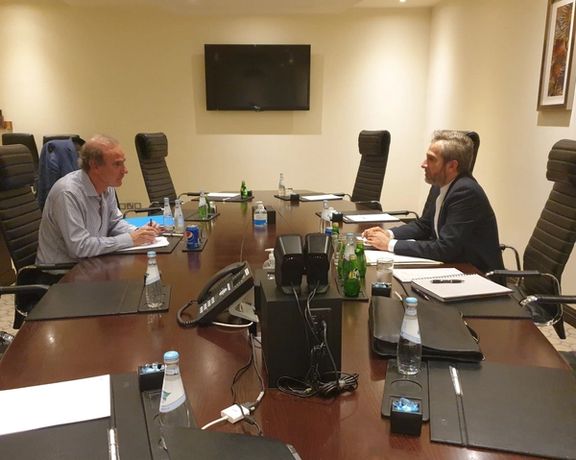
Indirect talks between Tehran and Washington in Qatar to resolve remaining issues in negotiations to restore the landmark 2015 nuclear pact ended without progress.
Calling the proximity talks “two intense days” of negotiations, EU's envoy Enrique Mora tweeted Wednesday evening that “Unfortunately, not yet the progress the EU team as coordinator had hoped-for. We will keep working with even greater urgency to bring back on track a key deal for non-proliferation and regional stability.”
It is not clear whether there might be a further round, while Tehran and Washington have yet to comment on how the talks have progressed, or what they expect next.
Moreover, Axios quoted an unnamed US official as saying that "The Iranians have not demonstrated any sense of urgency, raised old issues that have been settled for months, and even raised new issues that are unrelated to the 2015 nuclear agreement.”
According to the source, “A deal has been available for some time. If there is a side that needs to take a decision, it’s them — and it’s been them for months."
Earlier in the day, Tasnim news agency, with links to the Revolutionary Guards, reported that the Tehran-Washington nuclear talks in Qatar had ended without agreement, a claim quickly rebutted by the foreign ministry.
Tasnim said the American side refused to give "guarantees for Iran's economic benefits” from the deal.
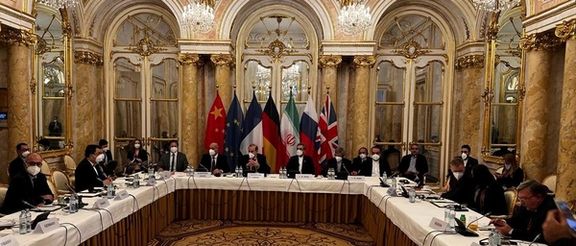
Revised version- Iran’s foreign ministry quickly rebutted a report Wednesday that Tehran-Washington nuclear talks in Qatar had ended without agreement.
The official news agency IRNA also weighed in, saying meetings were continuing and would end as planned today. It criticized un-named media for suggesting the negotiations had failed.
The talks at the Intercontinental hotel, Doha, were announced at the weekend and had been expected to last two to three days. It not clear whether there might be a further round. Tehran and Washington have yet to comment on how the talks have progressed, or what they expect next.
The meetings in Qatar have been coordinated by Enrique Mora, the senior European Union official who chaired the Vienna talks between Iran and six world powers aimed at restoring the 2015 Iran nuclear deal, which paused without agreement in March.
Mora has acted in Doha as a go-between in what EU foreign policy chief Josep Borrell dubbed ‘proximity talks,’ a format required by Iran’s refusal to talk face-to-face. Mora met Tuesday with Ali Bagheri-Kani, the deputy foreign minister leading the Iranian team, and separately with Robert Malley, the White House special envoy for Iran.
Tasnim’s account
In citing an “informed source” that the talks had failed, Tasnim, which is affiliated to Iran’s Revolutionary Guards, blamed US intransigence. “What prevented the talks reaching a positive result” was the US failure to offer “assurances over Iran’s economic benefits from a deal,” which for Iran were “red lines.”
Tasnim said US negotiators had insisted on a draft American text presented in the seventh round of discussions – back in December 2021 – in the year-long Vienna talks.
The agency’s report made no reference to the US listing of the Revolutionary Guards (IRGC) as a ‘foreign terrorist organization.’ Tehran’s demand for revoking the listing, made by President Donald Trump in 2019, was reportedly a central, unresolved issue in the stalling of the Vienna talks.
Attempts in the Vienna process to revive the 2015 deal (the JCPOA, Joint Comprehensive Plan of Action) struggled to agree on which US sanctions introduced since Washington left the nuclear agreement in 2018 violate the JCPOA, which offered Iran access to world markets without “discriminatory regulatory and procedural requirements in lieu of the sanctions.”
Tasnim criticized US President Joe Biden for “weakness and inability to make the decision that a restored JCPOA needs only US acceptance of Iran’s red lines over economic benefits.” The agency claimed Mora had criticized the US over the stance it was taking.